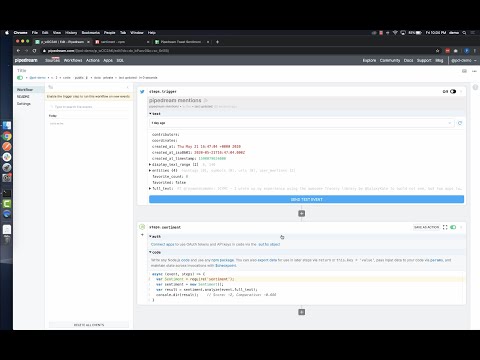What do you want to automate
with Google Sheets and GitHub?
Prompt, edit and deploy AI agents that connect to Google Sheets, GitHub and 3,000+ other apps in seconds.
Trusted by 1,000,000+ developers from startups to Fortune 500 companies
Popular Ways to Connect Google Sheets with GitHub#
Popular Google Sheets and GitHub Triggers#
Emit new event when a (classic) project card is created or moved to a specific column. For Projects V2 use New Issue with Status trigger. More information here
Emit new event each time a comment is added to a spreadsheet.
Popular Google Sheets and GitHub Actions#
Add a single row of data to Google Sheets. See the documentation
Add multiple rows of data to a Google Sheet. See the documentation
Find issues and pull requests by state and keyword. See the documentation
Get all values or values from a range of cells using A1 notation. See the documentation
Overview of Google Sheets#
The Google Sheets API allows for the creation, reading, updating, and deletion of data within Google Sheets, enabling a robust platform for spreadsheet management and data manipulation. Through Pipedream, you can craft serverless workflows that respond to various triggers, such as webhook events, emails, or scheduled times, to interact with Google Sheets. This synergy can automate reporting, synchronize data across applications, manage inventory, track leads in a CRM, or even conduct survey analysis by updating and retrieving sheet data on the fly.
Connect Google Sheets#
import { axios } from "@pipedream/platform"
export default defineComponent({
props: {
google_sheets: {
type: "app",
app: "google_sheets",
}
},
async run({steps, $}) {
return await axios($, {
url: `https://www.googleapis.com/oauth2/v1/userinfo`,
headers: {
Authorization: `Bearer ${this.google_sheets.$auth.oauth_access_token}`,
},
})
},
})
Overview of GitHub#
The GitHub API is a powerful gateway to interaction with GitHub's vast web of data and services, offering a suite of endpoints to manipulate and retrieve information on repositories, pull requests, issues, and more. Harnessing this API on Pipedream, you can orchestrate automated workflows that respond to events in real-time, manage repository data, streamline collaborative processes, and connect GitHub with other services for a more integrated development lifecycle.
Connect GitHub#
import { axios } from "@pipedream/platform"
export default defineComponent({
props: {
github: {
type: "app",
app: "github",
}
},
async run({steps, $}) {
return await axios($, {
url: `https://api.github.com/user`,
headers: {
Authorization: `Bearer ${this.github.$auth.oauth_access_token}`,
"X-GitHub-Api-Version": `2022-11-28`,
},
})
},
})
Related Videos#



Community Posts#


